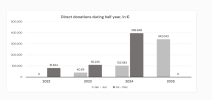TiredSam
Committee Member
From their newsletter, DeepL translation:
ME/CFS Research Foundation announces research funding strategy and appoints international scientific advisory board
Hamburg, August 18, 2023
Since 2022, we have been advocating for more biomedical research on ME/CFS. We and many other organizations, initiatives and people affected by ME/CFS are calling for more public research funding. For decades, much less research has been done on ME/CFS than on other diseases that are similarly common or even less common. The interest of the pharmaceutical industry is correspondingly low to invest money for clinical studies in a disease that has so far been insufficiently researched. As a result, there are still no causal therapeutic options for this chronic and often severe disease.
Today, we would like to make our overarching objective as a research-funding organization more concrete and thus more transparent. Because our work needs a lot of money and commitment, which we can only achieve with many donations and a high level of trust from those affected, donors, the scientific community and the public.
zur Förderstrategie der ME/CFS Research Foundation
We also recently announced the appointment of our internationally staffed Scientific Advisory Board. The Advisory Board strengthens the scientific profile of the organization and will advise and support the direction of future direct research funding. This includes decisions on the allocation of funding to individual project proposals.
The Advisory Board includes renowned researchers from the Netherlands, Norway, England, Poland, Portugal and Austria who have been researching and publishing on ME/CFS for many years and are internationally networked. The breadth of experience ranges from basic research to clinical research to biostatistics, and is thus aligned with the focus of the Foundation - the promotion of biomedical research on ME/CFS. Members of the Scientific Advisory Board include Jeroen den Dunnen, Øystein Fluge, Eliana Lacerda, Olav Mella, Nuno Sepúlveda, Karl Johan Tronstad, Francisco Westermeier and Pawel Zalewski.
mehr über den internationalen, wissenschaftlichen Beirat
ME/CFS Research Foundation announces research funding strategy and appoints international scientific advisory board
Hamburg, August 18, 2023
Since 2022, we have been advocating for more biomedical research on ME/CFS. We and many other organizations, initiatives and people affected by ME/CFS are calling for more public research funding. For decades, much less research has been done on ME/CFS than on other diseases that are similarly common or even less common. The interest of the pharmaceutical industry is correspondingly low to invest money for clinical studies in a disease that has so far been insufficiently researched. As a result, there are still no causal therapeutic options for this chronic and often severe disease.
Today, we would like to make our overarching objective as a research-funding organization more concrete and thus more transparent. Because our work needs a lot of money and commitment, which we can only achieve with many donations and a high level of trust from those affected, donors, the scientific community and the public.
zur Förderstrategie der ME/CFS Research Foundation
We also recently announced the appointment of our internationally staffed Scientific Advisory Board. The Advisory Board strengthens the scientific profile of the organization and will advise and support the direction of future direct research funding. This includes decisions on the allocation of funding to individual project proposals.
The Advisory Board includes renowned researchers from the Netherlands, Norway, England, Poland, Portugal and Austria who have been researching and publishing on ME/CFS for many years and are internationally networked. The breadth of experience ranges from basic research to clinical research to biostatistics, and is thus aligned with the focus of the Foundation - the promotion of biomedical research on ME/CFS. Members of the Scientific Advisory Board include Jeroen den Dunnen, Øystein Fluge, Eliana Lacerda, Olav Mella, Nuno Sepúlveda, Karl Johan Tronstad, Francisco Westermeier and Pawel Zalewski.
mehr über den internationalen, wissenschaftlichen Beirat

 register now: International ME/CFS Conference 2025
register now: International ME/CFS Conference 2025